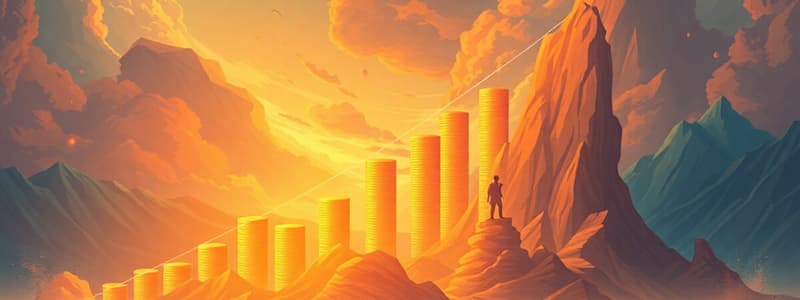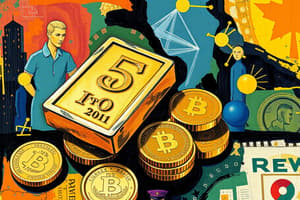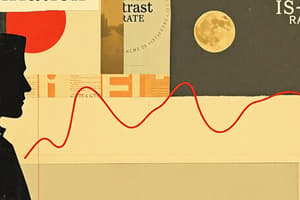Podcast
Questions and Answers
What is the primary characteristic of inflation?
What is the primary characteristic of inflation?
- A sustained decrease in the general price level over time.
- A fluctuating price level with no clear trend.
- A sustained rise in the general price level over time. (correct)
- A period of falling prices followed by a period of rising prices.
Which term describes a situation where the rate of inflation is decreasing?
Which term describes a situation where the rate of inflation is decreasing?
- Disinflation (correct)
- Deflation
- Inflation
- Stagflation
If a country’s economy grew by 5% in a year, but inflation was 3%, what was the real economic growth?
If a country’s economy grew by 5% in a year, but inflation was 3%, what was the real economic growth?
- 5%
- 2% (correct)
- 15%
- 8%
What is a key trigger for demand-pull inflation?
What is a key trigger for demand-pull inflation?
What is the definition of nominal GDP?
What is the definition of nominal GDP?
Which situation best describes cost-push inflation?
Which situation best describes cost-push inflation?
If the average price level in an economy falls, what is this phenomenon called?
If the average price level in an economy falls, what is this phenomenon called?
A fiscal stimulus is MOST LIKELY to contribute to which type of inflation?
A fiscal stimulus is MOST LIKELY to contribute to which type of inflation?
Which of the following is a direct consequence of an increase in the price of raw materials?
Which of the following is a direct consequence of an increase in the price of raw materials?
How can trade unions contribute to inflation?
How can trade unions contribute to inflation?
What is a potential impact of a depreciation in the exchange rate on inflation?
What is a potential impact of a depreciation in the exchange rate on inflation?
Which action by a central bank is a direct example of quantitative easing?
Which action by a central bank is a direct example of quantitative easing?
Under what circumstance would an increase in the money supply be most likely to cause inflation?
Under what circumstance would an increase in the money supply be most likely to cause inflation?
How are individuals with a fixed income affected by inflation?
How are individuals with a fixed income affected by inflation?
How does inflation affect the real value of debt?
How does inflation affect the real value of debt?
What is a potential effect of monopolies on inflation?
What is a potential effect of monopolies on inflation?
Flashcards
Inflation
Inflation
A sustained increase in the general price level over time, leading to a decrease in the purchasing power of money.
Deflation
Deflation
A sustained decrease in the general price level over time, leading to an increase in the purchasing power of money.
Disinflation
Disinflation
A slowdown in the rate of inflation, meaning prices are still rising but at a slower pace.
Nominal Value
Nominal Value
Signup and view all the flashcards
Real Value
Real Value
Signup and view all the flashcards
Demand-Pull Inflation
Demand-Pull Inflation
Signup and view all the flashcards
Cost-Push Inflation
Cost-Push Inflation
Signup and view all the flashcards
Real GDP
Real GDP
Signup and view all the flashcards
Rising Raw Material Costs
Rising Raw Material Costs
Signup and view all the flashcards
Rising Labor Costs
Rising Labor Costs
Signup and view all the flashcards
Inflationary Expectations
Inflationary Expectations
Signup and view all the flashcards
Indirect Taxes
Indirect Taxes
Signup and view all the flashcards
Depreciating Exchange Rate
Depreciating Exchange Rate
Signup and view all the flashcards
Monopolies
Monopolies
Signup and view all the flashcards
Growth of Money Supply
Growth of Money Supply
Signup and view all the flashcards
Study Notes
Inflation
- Inflation is a sustained rise in the general price level over time, reducing the purchasing power of money.
- Deflation is the opposite, where the average price level falls, and there is a negative inflation rate.
- Disinflation is when the average price level is rising, but at a slower rate.
Distinction between Money Values and Real Data
- Nominal value is the money value of data.
- Real value is the data adjusted for inflation.
- Real GDP is the GDP adjusted for inflation, indicating the true economic growth.
- Nominal GDP is the GDP without inflation adjustment, potentially overstating growth.
Causes of Inflation
Demand-Pull Inflation
- Occurs when aggregate demand grows unsustainably, putting pressure on resources.
- Causes include:
- Depreciation in exchange rates (imports more expensive, exports cheaper)
- Fiscal stimulus (lower taxes, increased spending, increasing disposable income)
- Lower interest rates (encouraging spending and borrowing)
Cost-Push Inflation
- Occurs when firms face rising costs.
- Causes include:
- Increased raw material prices (e.g., oil)
- Increased labor costs (e.g., wage increases)
- Expectations of inflation (higher wages to compensate)
- Indirect taxes (e.g., on fuel or cigarettes)
- Monopolies exploiting market power
Growth of Money Supply
- Excessive increases can lead to hyperinflation—uncontrollable rapid inflation.
- Relevant in cases where money supply grows faster than real output.
- Quantitative easing (QE) is a tool used by central banks to stimulate the economy, increasing money supply and lowering interest rates.
Effects of Inflation
Consumers
- Low and fixed incomes are most affected by inflation due to its regressive nature.
- Cost of necessities (food, water) becomes a bigger issue.
- Inflation reduces the real value of debt (if loans are not adjusted)
Firms
- Low interest rates may encourage investment, however, higher interest rates are more likely during high inflation decreasing investment.
- Price competitiveness can decrease if inflation is higher than in competitor countries.
- Uncertainty about future costs can reduce investment.
Workers
- Real incomes fall with inflation, leading to lower disposable income.
- Increased costs for firms could lead to redundancies.
Government
- Government payments need adjustment to compensate for rising costs during inflation.
Studying That Suits You
Use AI to generate personalized quizzes and flashcards to suit your learning preferences.




